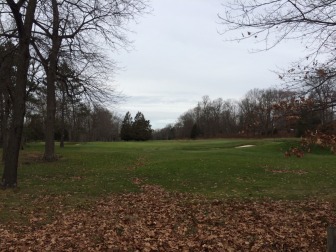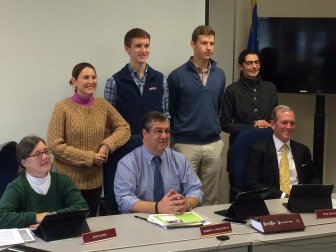Researchers say they’ve detected a higher incidence of pesticides in surface waters in New Canaan this year than last, mostly “downstream” of the Country Club of New Canaan’s golf course.

New Canaan High School juniors Paul Gelhaus and Connor deMayo, environmental research fellows with Pesticide-Free New Canaan. Credit: Michael Dinan
Of the 28 different pesticides (four more than in 2013) detected by New Canaan High School juniors Connor deMayo and Paul Gelhaus—environmental research fellows with Pesticide-Free New Canaan, a nonprofit organization—more than 60 percent were found “directly after the golf course on Country Club Road,” deMayo said Tuesday during a presentation to the Board of Selectmen.
“Coming into New Canaan, there are relatively few pesticides, and after the golf course there are really a lot of pesticides in the water,” he said during the meeting, held in the Training Room at the New Canaan Police Department.

Country Club of New Canaan golf course. Credit: Michael Dinan
The reason is likely from “point source pollution” that flows into the Fivemile River, among other places, he said.
Under the direction of Pesticice-Free co-founders Heather Lauver and Miki Porta, the teens this summer performed water sampling and lab and computer analyses, among other work, at 14 research sites in New Canaan—mostly along the Fivemile River.
Findings from their analysis show an entirely legal use of pesticides in New Canaan, they said, though some have known negative health effects. Those can include gastro/liver tumors and inflammation; neurological disorders and seizures, respiratory problems and potentially fetal toxicity, they said.

Standing, L-R: Heather Lauver, Connor deMayo, Paul Gelhaus, Miki Porta. Sitting: Beth Jones, Rob Mallozzi, Nick Williams. At the Dec. 2, 2014 Board of Selectmen meeting, held in the Training Room at the New Canaan Police Department. Credit: Michael Dinan
“The concerns that arise with these pesticides is that they are not only harmful to their target—usually it’s a plant or an insect—but they are also harmful to people,” Gelhaus said. “And they can get tracked into homes—if you go for a walk and get some on your shoes—they can cause a lot of health problems and one of the big issues with them is that a lot of them have carcinogens, which is not good.”
The selectmen, after thanking deMayo and Gelhaus, clarified that no one appears to be breaking the law in using pesticides, and also expressed concern about what was found, and talked about steps that New Canaan legally could take to mitigate the potential for harm.
“I think with all respect to my friends at the Country Club, this is pretty obvious and speaks for itself,” Selectman Nick Williams said. “Upstream you have got nothing and then—boom—golf course, it is just a huge spike and then worse, it’s not just at the golf course but continues down[stream].”
Responding to First Selectman Rob Mallozzi’s question about what sort of communications Pesticide-Free New Canaan has had with the Country Club, Lauver said officials there don’t want chemicals in the water because it indicates they’re wasting money and they don’t want to harm the environment. The pushback, she said, has been that Country Club golfers “have very strict standards” for their course—that’s a barrier to maintaining fairways and greens organically.
“The attitudes have to change and we have to have a different attitude about what is green in this community, and that is the crux of the issue,” Lauver said. Country Club officials could not be reached for comment.
In Connecticut, school grounds including athletic fields up to the high school level cannot use pesticides. New Canaan leaders years ago opted to extend the ban to the high school’s grounds.
The selectmen commended Parks Superintendent John Howe—in the room on a separate matter—for his sparing use of pesticides in keeping up New Canaan’s playing fields in public parks and places such as Conner Field.
Part of the difficulty in setting local policy regarding use of pesticides on private land is that a municipality in Connecticut may not impose stricter regulations than those set by the state (as per a 1983 statute, here).
Porta said she and Lauver have testified in Hartford with an eye on passing a preemption law that would allow New Canaan to set its own standards.
“Certainly in a community like ours, where we have resources and talent and ability, we felt we were being held back from doing whatever we felt was in our best interests, even if the state couldn’t keep up,” Porta said.
Selectman Beth Jones encouraged the NCHS students to lend their help in efforts to educate the wider community about alternatives to pesticide use.
“I think there are a lot of people in town beyond the golf course that are having other people care for their lawns for them, and as long as it looks good they are not even thinking about the repercussions of that, and if they were educated about what it means, they may change their practice,” she said.
